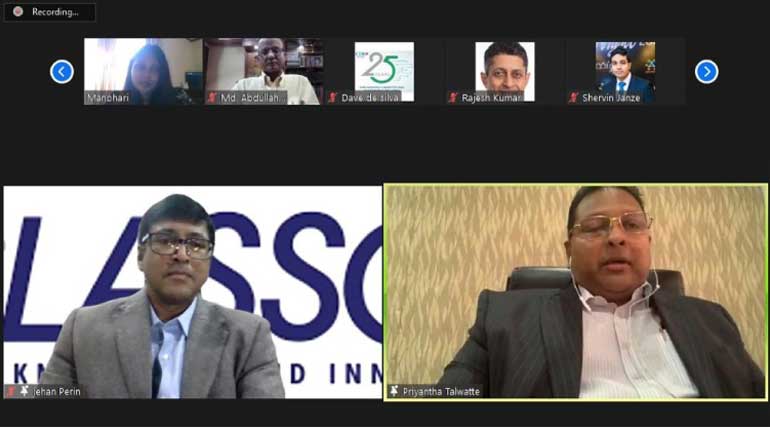Wednesday Feb 18, 2026
Wednesday Feb 18, 2026
Saturday, 29 May 2021 00:00 - - {{hitsCtrl.values.hits}}

Jehan Perinpanayagam and Priyantha Talwatte at the panel discussion
With automation offering tremendous potential to drive transformation in organisations, business leaders today understand that its successful implementation is vital to retaining competitive edge and thriving in the new normal.
Giving an insight into how automation is becoming a boardroom discussion and transitioning for new ways of working, SLASSCOM recently held its first virtual webinar, South Asia Hyperautomation in the Banking and Financial Services Industry in collaboration with Eguardian and UiPath.
Attended by a great lineup of top thought leaders in the industry from three countries that included, Sri Lanka, Bangladesh and India, the event focused on how automation will shape the future of work over the next few years and on practical experiences and learnings.
Commencing the discussion, SLASSCOM Finance Director, BPM Forum Board Lead and Infomate CEO Jehan Perinpanayagam stated that SLASSCOM has launched a centre of excellence for intelligent automation with a view to promoting Sri Lanka as an international centre of excellence and to foster the adoption of technology among corporates in Sri Lanka. It is envisaged that the technology will play a key role towards achieving a goal of $ 5 billion in export revenue by 2025, along with creating 200,000 new jobs in the IT industry and 1,000 new start-ups.
He further noted that upskilling and certification of a large talent pool in Robotic Process Automation to help enhance and improve business processors was also a part of the agenda with this summit being one of the first in a series of programs that will take place for same.
Uipath Managing Director Anil Bhasin, the keynote speaker of the event, stated that automation would be the next disruption of work, and along with globalisation, digitisation and mobility, automation is set to being the next in line for successful business continuity in the future. This will require enabling a fully-automated enterprise that would include assigning automatable work to robots, proving a robot for every person in the company, democratising development and unleashing AI across every facet of work.
Uipath Director – Banking Practice Nithin Purwar talked about how BFS institutions are globally embracing automation, and highlighted the automation trends predicted for the financial services in the Asian region, which showcased that RPA spending by 2024 would be in the range of $ 271 million with all small business loans originating through AI-enabled and automated processors. He further stated that RPA is gaining traction due to the many benefits it offers in accelerating the scaling of enterprises, improving customer experience and employee engagement, business and operations resiliency and efficiency and in minimising risks.
A panel discussion followed on ‘The industry perspective of automation’, moderated by Jehan Perinpanayagam, and participated by top bankers in the industry that included Nations Trust CEO Priyantha Talwatte, National Savings Bank Independent Non-Executive Director Manohari Abeysekara, United Commercial Bank Deputy Managing Director and COO Md. Abdullah Al Mamoon, CDB Executive Director – Business Operations Dave De Silva and LOLC Technologies Ltd./LOLC Finance Chairman, Director/CEO Conrad Dias, who shared the challenges faced and best practices adopted.
The main takeaways from the discussion were that automation is already being implemented by Sri Lankan BFSI companies with multiple use cases with very impressive results; and that automation would be a key to survival in the hyper competitive market in the BFS industry and a key tool in coping with increasing customer demands and employee satisfaction levels.
SLASSCOM as the national chamber for the knowledge and innovation industry in Sri Lanka with over 300 member companies accounting for 90% of the IT-BPM industry export revenue, and the potential to become the No. 1 export revenue earner for the country, intends to play an integral role in assisting organisations successfully adopt to automation.